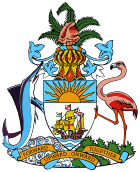 |
|---|
General elections were held in the Bahamas on 2 May 2002. The opposition Progressive Liberal Party (PLP) won 29 of the 40 seats in the House of Assembly to defeat the governing Free National Movement (FNM). Voter turnout was 90%. [1]
 |
|---|
General elections were held in the Bahamas on 2 May 2002. The opposition Progressive Liberal Party (PLP) won 29 of the 40 seats in the House of Assembly to defeat the governing Free National Movement (FNM). Voter turnout was 90%. [1]
In the 1992 election the Free National Movement came to power after defeating the then governing Progressive Liberal Party. Their leader Hubert Ingraham served as prime minister from 1992 until he announced his intention to step down as prime minister at the 2002 general election. [2] Tommy Turnquest was then narrowly elected as the next leader of the FNM and would be the party's candidate for prime minister at the election. [3]
The FNM government suffered a setback in February 2002 when an attempt to amend the constitution was rejected in a referendum. [3] The referendum had been contested between the two main parties after the PLP reversed their earlier support and campaigned against the changes. [2] [3]
A record 132 candidates stood in the election for the 40 seats in the House of Assembly that were being contested. [4] These were from 4 political parties and included 40 from the governing FNM and 37 from the opposition PLP. [4] As well as the candidates from political parties there were also 14 independents. [4]
The FNM defended their time in government, pointing to the strong economic growth over the period and the large amount of foreign investment that had come into the Bahamas. [3] Their new leader Tommy Turnquest pledged to continue as they had been doing under Hubert Ingraham. [2] However the opposition PLP criticised the FNM as being out of touch and attacked them for being too quick to comply with the OECD's Financial Action Task Force on Money Laundering. [3] The PLP said that they would help the less well off and develop islands they said had been neglected by the FNM. [5]
Both parties made fierce attacks on each other with the FNM reminding voters of the scandals over drug money that had led to the PLP losing power back in 1992. [4] Meanwhile, the PLP accused the FNM's Tommy Turnquest of corruption over the awarding of government contracts. [4] Despite the harsh campaign, outside commentators expected little change in policies whichever party was successful in the election. [2]
There was no trouble on election day, with schools and liquor stores being closed and polling stations seeing a high turnout. [4] [6]
The results saw the PLP win over half of the vote and 29 of the seats in the House of Assembly. [5] The FNM conceded defeat, with their leader Tommy Turnquest being one of several cabinet ministers to lose their seats. [4] [5] [7] The leader of the PLP, Perry Christie, became the new prime minister of the Bahamas on 3 May 2002. [4] [5]
 | |||||
|---|---|---|---|---|---|
| Party | Votes | % | Seats | +/– | |
| Progressive Liberal Party | 66,897 | 51.78 | 29 | +24 | |
| Free National Movement | 52,803 | 40.87 | 7 | −28 | |
| Coalition + Labour | 2,793 | 2.16 | 0 | New | |
| Bahamas Democratic Movement | 414 | 0.32 | 0 | New | |
| Bahamas Constitution Party | 12 | 0.01 | 0 | New | |
| Our Survivors | 10 | 0.01 | 0 | New | |
| Independents | 6,272 | 4.85 | 4 | +4 | |
| Total | 129,201 | 100.00 | 40 | 0 | |
| Valid votes | 129,201 | 98.97 | |||
| Invalid/blank votes | 1,344 | 1.03 | |||
| Total votes | 130,545 | 100.00 | |||
| Registered voters/turnout | 144,758 | 90.18 | |||
| Source: Caribbean Elections | |||||

The Bahamas is a parliamentary constitutional monarchy headed by King Charles III in his role as King of the Bahamas. The politics of The Bahamas takes place within a framework of parliamentary democracy, with a Prime Minister as the Head of Government. The Bahamas is an Independent Country and a member of the Commonwealth of Nations. As a former British colony, its political and legal traditions closely follow those of the United Kingdom. King Charles III is the head of state, but executive power is exercised by the cabinet. Legislative power is vested in the two chambers of parliament. The Judiciary is independent of the executive and the legislature and jurisprudence is based on English common law. The multi-party system is dominated by the Progressive Liberal Party and the Free National Movement. The constitution protects freedom of speech, press, worship, movement, and association.
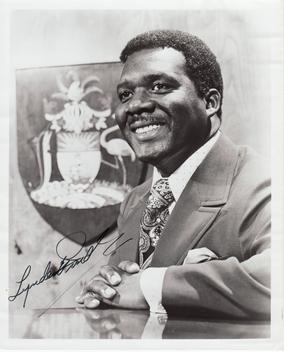
Sir Lynden Oscar Pindling, KCMG, PC, NH, JP was a Bahamian politician who is regarded by some as the "Father of the Nation", having led the Bahamas to majority rule and independence.

Perry Gladstone Christie PC, MP is a Bahamian former politician who served as prime minister of the Bahamas from 2002 to 2007 and from 2012 to 2017. He is the second longest-serving Bahamian elected parliamentarian, representing the Centreville constituency from 1977 to 2017. He is also a former athlete. His Progressive Liberal Party is the oldest Bahamian political party, holding solid majorities in the Bahamian Parliament several times in its long history.
The Free National Movement is a political party in the Bahamas formed in the early 1970s and led by Sir Cecil Wallace-Whitfield. The current leader of the party is Michael Pintard and the current deputy leader is Shanendon Cartwright.

The Progressive Liberal Party is a populist and social liberal party in the Bahamas. Philip Davis is the leader of the party.

Hubert Alexander Ingraham, PC is a Bahamian politician who was Prime Minister of the Bahamas from August 1992 to May 2002, and again from May 2007 to May 2012. He is a member of the Free National Movement Party (FNM). Prior to the 2012 election, he was the FNM's Party Leader and member of Parliament for the North Abaco constituency. He served as leader of the opposition in the House of Assembly of the Bahamas from 2005 to 2007.

Elections in the Bahamas take place in the framework of a parliamentary democracy. Since independence, voter turnout has been generally high in national elections, with a low of 87.9% in 1987 and a high of 98.5% in 1997. The current Prime Minister is The Hon. Philip Davis. The electorate is less than half of citizenry.

The Bahamas Democratic Movement (BDM) is a liberal-populist political party in the Bahamas representing the interests of young people.

General elections were held in the Bahamas on 2 May 2007. The result was an opposition victory, with the Free National Movement, led by former Prime Minister Hubert Ingraham, claiming 23 of the 41 seats. Incumbent Prime Minister Perry Christie conceded defeat in a phone call to his rival. Ingraham was sworn into the office of Prime Minister on 4 May.
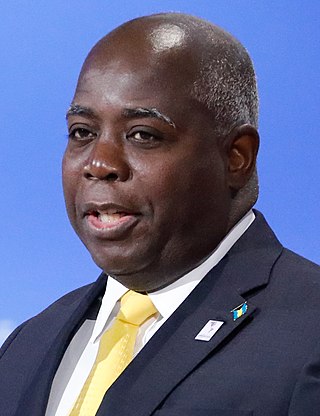
Philip Edward "Brave" Davis is a Bahamian politician serving as the prime minister of the Bahamas since 2021. He was the Member of Parliament (MP) for Cat Island, Rum Cay & San Salvador from 1992 to 1997 and returned to the seat in May 2002, which he still represents.

Orville Alton Thompson "Tommy" Turnquest, CBE is a Bahamian politician.

General elections were held in the Bahamas on 19 August 1992. The result was a victory for the opposition Free National Movement (FNM), which received 55% of the vote and won 33 of the 49 seats in the House of Assembly, while the ruling Progressive Liberal Party (PLP) lost nearly half their seats, winning only 16.
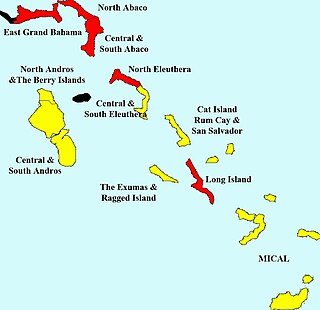
General elections were held in the Bahamas on 7 May 2012. They were the first general election in which a third party offered a full slate of candidates alongside the two major parties, the Free National Movement and the Progressive Liberal Party (PLP). The result was a victory for the opposition PLP, whose leader Perry Christie became prime minister.

Hubert Alexander Minnis, ON is a Bahamian politician and doctor who served as prime minister of the Bahamas from May 2017 to 16 September 2021. Minnis is the former leader of the Free National Movement, the former governing party, and the Member of Parliament for the New Providence constituency of Killarney. First elected to the legislature in the 2007 election, he succeeded Hubert Ingraham as party leader following the party's defeat in the 2012 election.

The prime minister of The Bahamas is the head of government of The Bahamas. The prime minister is formally appointed into office by the Governor-General of The Bahamas, who represents Charles III, the King of The Bahamas.
Loretta Butler-Turner is a Bahamian mortician and politician. She was the leader of the opposition in the Bahamian Parliament from December 2016 to May 2017.

General elections were held in the Bahamas on 10 May 2017. The elected members of the House of Assembly then elected the Prime Minister.
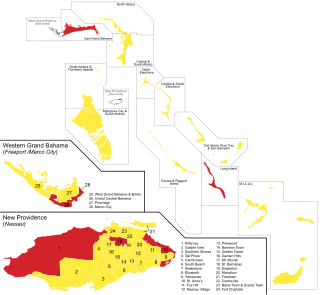
General elections were held in the Bahamas on 16 September 2021 to elect all 38 members of the House of Assembly.
Sir Cecil Vincent Wallace-Whitfield was a Bahamian politician who was a founding member and the first leader of the Free National Movement political party. He also served as a Minister in the cabinet of Lynden Pindling from 1967 to 1970 and as a longtime member of the Bahamian Parliament.
Edison McGinnis Key is a Bahamian politician and former Member of Parliament. He is best known for representing Central and South Abaco as a Member of Parliament. He served in various capacities during his 40-year political career, including two terms as a Senator and as chairman of the Bahamas Telecommunications Corporation (BaTelCo) and chair of the Bahamas Agricultural and Industrial Corporation (BAIC).